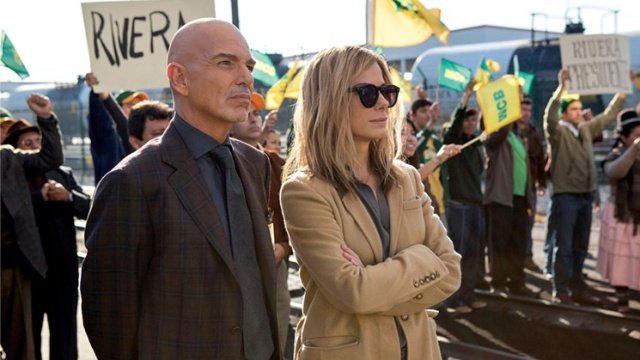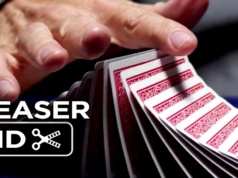Last weekend, two movies that are becoming a rare breed were released in theaters: the behind-the-scenes chronicle of drama during Dan Rather’s CBS ousting in Truth and the political dark comedy Our Brand Is Crisis.
Both harness indelible star power to tell detailed stories of public service (or brazen lack thereof). Their plots unfold methodically, with an intellectual demand that Hollywood has subtly started airbrushing from the public brain through bad superhero movies and a steady erosion of the independent film scene.
Our Brand Is Crisis is directed by David Gordon Green, a poetic journeyman from Richardson, Texas. It is a loose adaptation of Rachel Boynton’s documentary of the same name, where a high-profile political-consulting firm flies into Bolivia to aid the establishment candidate Gonzalo (Goni) Sanchez de Lozada against the younger populist candidate (think Hope & Change).
Rachel Boynton’s documentary shows that James Carville’s victory in repackaging his Bolivian candidate Goni Lozada as a “fighter,” a man to trust in a crisis (a man he’d never represent in the U.S. but, for the right price, will elsewhere) leads directly to a riot. SPOILER ALERT: One of the last shots of the documentary is a boy’s dead body slumped on the steps of a building. The George Clooney-produced film version eschews the ghastly image but does end with a riot. /SPOILER ALERT
In the film, the unpopular former president is called Castillo (Joaquin de Aimeida). His consultant team is struggling to craft a media campaign that connects with the voters, and we see the poorly made video orchestrated by nincompoop Buckley (Scoot McNairy), in which Castillo catches a small child who’s falling dramatically from the clouds.
Our Brand Is Crisis
Rated R; 1:48:00
The will and desires of the people, however, are represented by a volunteer named Eddie (Reynaldo Pacheco) and his friends Pepe (Octavio Berrios) and Abraham (Luis Chavez). Eddie blindly praises Castillo because at a campaign stop he picked him up when little Eddie was a baby. It made his father proud. Meanwhile, Pepe and Abraham are engaged as activists who condemn Castillo’s blind complicity with austerity measures enforced by the International Monetary Fund.
For the most part, the film ignores the intricacies of the peoples’ complaints and beyond, partly because that’s what the American consultants do: Their art is style and diversion, marketing a face. Sandra Bullock’s uber strategist “Calamity” Jane only learns about the Spanish side of the story by getting drunk with the plebes and sling shotting a figurine head of the opposition candidate at rival strategist Pat Candy’s (Billy Bob Thornton) hotel room window.
After a beautiful performance in Alfonso Cuaron’s Gravity, it’s to Sandra Bullock’s great credit that she made a creative transposition herself, reading the James Carvillean character in the Crisis script and approaching the producers with the suggestion they change the name so she could play it.
Then, the character who actually looks like Carville (Thornton) is moved over as the slithery rival operative, representing the hope-and-change candidate (but surreptitiously spreading grassroots flyers alleging Castillo is a member of a cult, which gives Jane the idea of finding images of Nazi generals for a flyer of her own).
The filmmakers provide a back story to Jane’s rough-and-tumble political past. SPOILER ALERT: She was good, but the business also made her an addict. She is cajoled into taking the Bolivian job by a persistent Ben (Anthony Mackie) while hiding from humanity in the mountains, where she has quit all politics, avoids intoxicating substances and makes clay pots. /SPOILER ALERT.
The open frailties that accompany Jane’s transition back into the game account for the off-kilter comedy Green fashions in the film’s first hour. We see Bullock falling down the airplane steps in classic slapdash style, but we also see her sheer lifelessness in the campaign meetings: trench coat, bug-eye glasses and huffing on an oxygen tank while the smartest guys in the room fumble around, lose track of a llama and misquote Shakespeare.
The odd set up ultimately accounts for the interesting spiritual subtext Green develops to critique the sleazy (yet fun) political process, and perhaps save it. But it takes a while for her to see the light. Calamity Jane eventually starts campaigning again, and smoking and drinking again. She’s galvanized by her hatred of Pat Candy and haunted by a past to which the other characters allude.
As inspiration kicks in, the answer for the marketing team becomes re-branding their candidate as the Strong Man, a leader that struggling people will flock to in a time of crisis (a fascist notion). And she’ll dig up all the negative history from the hope-and-change candidate (using the young mole LeBlanc, played by Zoe Kazan).
The oddly triumphant tone of the film, the essential film logic that you are supposed to root for Sandra Bullock’s character, counterbalances the cynical and self-destructive tactics Jane uses. The actress digs into serious depths of anguish and despair without sacrificing her innate comic timing. There’s sometimes quiet contemplation in this role: Though she picks up the fight, she still sequesters herself alone in her hotel room. The more she interacts with the actual people of Bolivia, the more she chafes against the company of her political colleagues – and the more she starts thinking about her clay pots again, artifacts of her life in recovery.
The real message of Our Brand Is Crisis is embedded almost solely in a raw performance. It reaches impressive acting heights and deep philosophical lows, as when Jane interrupts Castillo during a debate rehearsal after he has again revealed his arrogance and disconnect. In tipping over into argument with the stubborn man, Bullock, like she did in Gravity, conveys poignantly how far out into psychic no man’s land her character has traveled.
Moderator: Senator, how do you respond to people who are calling for constitutional reform and greater representation for the indigenous peoples of Bolivia?
Castillo: Well, you do not use a blunt knife for surgery. These people are not educated …
Jane: Sorry! I’m sorry. ‘These people?’ Are you kidding me?
Castillo: Enough!
Moderator: OK, let’s take five.
Castillo: I hired you.
Jane: Nobody hired me. I cannot be hired. Unless you mean in the technical sense. Then, yes, I probably was hired.
Castillo: Let me make this clear to you, I am the one in charge.
Jane: No, no, no. See, you’re not in charge.
Castillo: What did you just say?
Jane: Maybe nobody’s in charge. Maybe we’re just rolling down a fucking hill and there’s no one at the wheel, I don’t know. So why can you not say what you are supposed to say!? Where’s the problem?
Castillo: Because I’m not just a puppet to play with.
Jane: Of course you are! Of course you are a puppet. We’re just pawns.
Green’s film seems to say, Look what the hazards of this process have done to a talented woman, pictured persuasively here to be: American Success Story as an Erratic Addict. It’s a challenging journey that subverts most of the film’s cliche entrapments.
The risk of being ‘boring’
Two weeks ago, Oscar-hopeful Steve Jobs proved fantastically written, quirkily directed, and acted to perfection, but, perhaps anachronistically, it was constructed as a play about one man’s psychodrama – where the voices in his head appear as the voices of his friends. The film debuted at remarkably low numbers, sending a big NO signal to Hollywood about the viability of “arty” adult dramas.
In such a climate, daring to be “boring” is a risk, but perhaps making lively art out of the dry details is still a risk worth taking. On Nov. 1, Warner Bros issued a rare public statement of embarrassment about Our Brand Is Crisis’ opening weekend performance.
But one would hope the filmmakers are proud of the work put into an achievement that’s becoming a rare commodity, and, admittedly, really hard to pull off using film language (Crisis had justly been criticized for its tonal and stylistic imbalances).
About the IMF
At a protest that halts the campaign bus, villagers and a folksy economist debate Castillo about his tone deafness to the people. This stems from a direct problem in Bolivia with its relationship with the IMF.
The IMF, as conceived by John Maynard Keynes in 1944, was a cooperative fund designed to help out struggling countries in crisis situations. By the 1950s and on into the ’80s and 2000s, the IMF started to function more as a bank, moving from guardian to overseer, and creating a set of conditions upon which a country could borrow, the goal being to allow a country to fix its macroeconomic imbalances itself. In order to borrow, a country like Bolivia would have to take austerity measures that can be violently difficult to enact ( restricting imports, cutting spending on government, school and health services, creating a stock market, ending price subsidies of food and fuel, and, flattering to the superpowers, enhancing the rights of foreign investors).
In 2001, a collapse occurred in Argentina, in part caused by budget restrictions that hurt the national infrastructure, health, education and security. This led to widespread hatred of the IMF in Latin American countries.






















